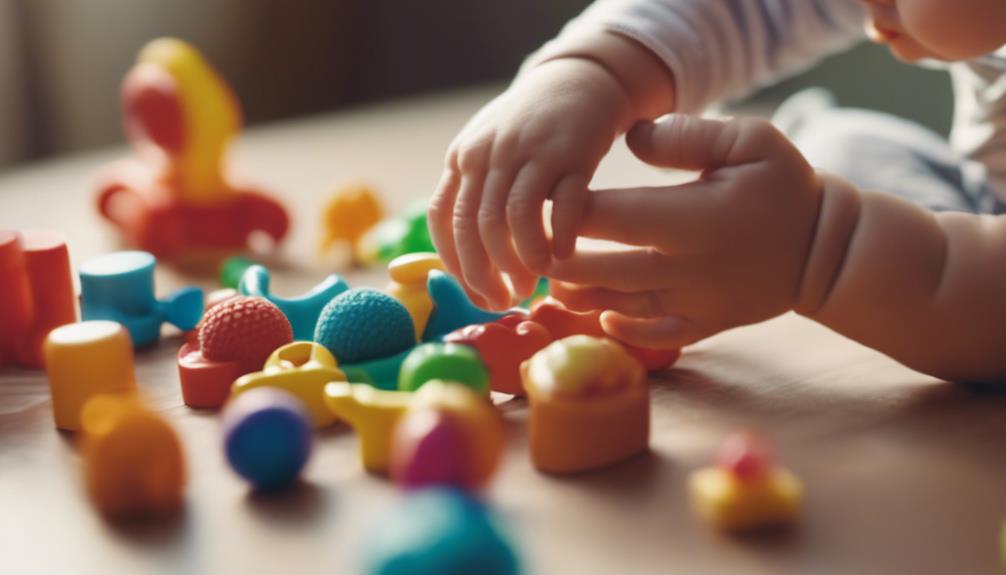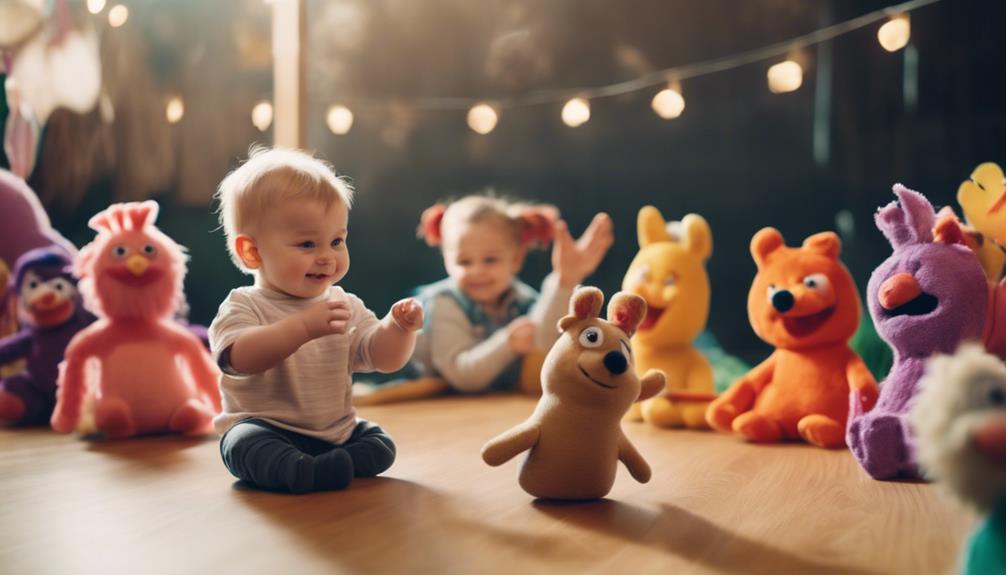Improve your baby’s brain development through simple techniques. Participate in Serve and Return Interactions to build strong connections. Reading Books Together enhances language abilities. Mirrors encourage visual stimulation and self-awareness. Hand exercises aid in improving motor skills. Puppet play promotes creativity and communication. Baby sign language helps in deciphering needs. Skin-to-skin contact boosts emotional and physical health. Tummy time helps in strengthening muscles and avoiding flat head syndrome. Minimize noisy toys for enhanced concentration. Choose peaceful environments for cognitive advancement. Discover more valuable tips to assist in your baby’s growth and development.
Key Takeaways
- Engage in serve-and-return interactions for healthy development.
- Read books together to boost language skills and bonding.
- Use mirrors for visual stimulation and cognitive growth.
- Practice hand exercises for fine motor skills development.
- Incorporate puppet play for cognitive development and creativity.
Serve and Return Interactions
To promote healthy development, engage in serve and return interactions with your baby by responding promptly and appropriately to their cues. This technique involves a back-and-forth interaction where you react to your baby's signals, creating a nurturing and engaging environment. Serve and return interactions are vital for fostering sensitivity, responsiveness, and strong parent-child bonds.
During tummy time, using mirrors can enhance serve and return interactions with your baby. Mirrors capture your baby's attention, encouraging them to focus, babble, and engage with their reflection. This visual stimulation is beneficial for their cognitive development and can make tummy time more enjoyable.
Additionally, reading books together is another form of serve and return interaction that promotes language development. By responding to your baby's reactions while reading, you aren't only encouraging a love for books but also helping them build essential language skills.
Incorporating these activities into your daily routine can have a lasting impact on your baby's growth and development.
Reading Books Together

Engage your baby in interactive reading sessions to boost their language skills and nurture a strong parent-child bond. Reading books together is a powerful way to support your baby's language development and stimulate their brain.
By exposing your baby to books early on, you're laying the groundwork for improved communication skills and cognitive growth. Research shows that babies who are read to regularly hear millions more words by the time they reach kindergarten, setting a solid foundation for literacy.
Choose books with colorful illustrations and simple stories that capture your baby's attention and imagination. These visual aids not only enhance their visual skills but also make the reading experience more engaging.
Reading together creates a special bonding time between you and your baby, fostering a love for books and learning from an early age. Make reading a part of your daily routine to reap the benefits of this enriching activity.
Using Mirrors for Engagement
Introducing mirrors to your baby can be a fun and beneficial way to enhance their visual stimulation and cognitive development. Mirrors provide newborns with an opportunity to focus and engage visually, especially during activities like tummy time.
As babies watch themselves in the mirror, they can become more aware of their movements and facial expressions, leading to increased interaction and babbling.
Using mirrors can aid in the development of self-recognition and cognitive skills in infants. By observing themselves in the mirror, babies start to understand their own reflections, which is an important milestone in their cognitive growth.
Early exposure to mirrors also supports visual tracking and encourages curiosity in babies as they explore their own images.
Practicing Hand Exercises

When practicing hand exercises with your baby, you're aiding in the development of their grasping skills and fine motor control.
By offering a variety of objects for them to grasp, you can challenge their hand-eye coordination and strengthen their hand muscles.
Engaging in these activities regularly can lead to improved dexterity and coordination as your baby grows.
Grasping and Releasing
To enhance your baby's grasping and releasing skills, provide a variety of objects with different shapes, sizes, and textures. Here are three ways to help your baby practice these essential hand exercises:
- Offer toys that vary in shapes, sizes, and textures to engage your baby's hands and promote fine motor skills development.
- Encourage squeezing soft toys or grasping rattles to strengthen hand muscles and improve hand-eye coordination.
- Let your baby explore objects with various grips to stimulate brain connections related to sensory processing and motor skills.
Engaging in grasping and releasing activities not only supports the development of fine motor skills and hand-eye coordination but also plays an important role in strengthening brain connections. By providing toys that require these motions, you can help your baby's overall cognitive and physical development.
Finger Dexterity Exercises
Enhance your baby's finger dexterity by incorporating engaging hand exercises that promote fine motor skills and coordination. Practicing finger dexterity exercises, such as grasping different objects, can help improve your baby's hand-eye coordination. By engaging in activities like picking up small toys or stacking blocks, your baby can develop the finger strength and control necessary for tasks like writing and drawing later on.
These exercises also play an important role in building the muscles and coordination needed for activities like self-feeding and buttoning clothes.
Encourage your baby to explore different textures and shapes with their hands to aid in sensory development and cognitive growth. This sensory stimulation not only enhances their overall development but also contributes to improving their fine motor skills.
Engaging in these finger dexterity exercises from an early age can lay a strong foundation for your baby's future motor skills and coordination abilities.
Sensory Stimulation Activities
Engage your baby in sensory stimulation activities through practicing hand exercises to promote cognitive development and fine motor skills.
- Grasping Objects: Encourage your baby to grasp objects of different shapes and sizes to enhance fine motor skills and hand-eye coordination.
- Exploring Textures: Provide sensory toys with various textures for tactile stimulation, allowing your baby to explore different sensations through touch.
- Multi-Sensory Experiences: Engage your baby in hand activities that offer multi-sensory experiences, stimulating brain development by involving different senses simultaneously.
Incorporating Puppets in Play

Engage your baby's senses and encourage interaction by incorporating puppets in playtime.
Interactive puppet shows can captivate your little one's attention and stimulate their cognitive development.
Try using puppets to create fun storytelling sessions that will enhance your baby's curiosity and focus.
Puppet Play Benefits
Incorporating puppets in play activities with your baby can greatly enhance cognitive development in various ways.
Engagement: Puppet play captures your baby's attention, encouraging active participation and fostering a sense of curiosity. As your little one interacts with the puppets, they learn to engage with their surroundings and develop essential focus skills.
Communication Skills: Through puppet play, babies have the opportunity to communicate verbally and non-verbally. By creating dialogues and stories with the puppets, infants practice language skills and enhance their ability to express themselves effectively.
Visual Skills: Puppets provide a visual stimulus that helps babies track movement and improve their visual tracking skills. Following the motions of the puppets enhances your baby's visual coordination and strengthens their ability to focus on objects, laying a foundation for future visual development.
Integrating puppets into playtime not only stimulates imagination and creativity but also offers a fun way to bond with your baby while creating meaningful learning experiences.
Interactive Puppet Shows
Enhancing your baby's playtime with interactive puppet shows can be a delightful way to foster cognitive development and create engaging experiences together. Puppet shows captivate babies with colorful characters and movements, aiding in the development of visual tracking skills as they follow the puppets' actions. These interactive shows stimulate cognitive growth by encouraging focus, anticipation, and reactions to the puppetry. Moreover, incorporating puppets in play activities can strengthen the parent-child bond as both engage in entertaining experiences.
| Benefits of Interactive Puppet Shows |
|---|
| Engages and entertains babies |
| Develops visual tracking skills |
| Stimulates cognitive development |
| Fosters the parent-child bond |
| Introduces storytelling and creativity |
Puppet Storytelling Ideas
To further enrich your baby's playtime experiences, consider exploring creative puppet storytelling ideas that incorporate puppets in play activities. Here are some tips to help you make the most of puppet storytelling for your little one:
- Enhance Language Development: Puppet storytelling can enhance your baby's language development by engaging them in interactive play where they can listen to stories and participate in conversations with the puppets.
- Stimulate Cognitive Skills: Using puppets in play can help babies focus on moving objects, encouraging interaction, and stimulating cognitive skills such as problem-solving and memory retention.
- Foster Imagination and Creativity: Incorporating puppets in play activities can foster imagination, creativity, and emotional connections with your baby, providing a fun and engaging way to support their overall development.
Try different puppet characters, voices, and storylines to keep the playtime exciting and educational for your little one.
Introducing Baby Sign Language

Consider starting your baby's communication journey by introducing baby sign language, a method that allows infants to express their needs before they can speak. Baby sign language enhances parent-child communication by providing a way for babies to convey their needs effectively.
Research indicates that using baby sign language can reduce frustration in infants by enabling them to communicate their needs early on. This method also strengthens the bond between parents and babies through interactive communication, fostering a deeper connection.
Introducing baby sign language early can support cognitive development and language skills in infants, laying a strong foundation for future learning and communication abilities. By incorporating simple signs like 'more,' 'eat,' or 'sleep,' babies can communicate their basic needs, leading to a more fulfilling and less frustrating interaction between parents and infants.
Give baby sign language a try to enhance your little one's communication skills and strengthen your relationship through early, effective communication.
Promoting Skin-to-Skin Contact

Introducing your baby to skin-to-skin contact can provide numerous benefits for both you and your little one. Here are three key advantages of promoting skin-to-skin contact:
- Bonding: Skin-to-skin contact promotes the release of oxytocin, known as the 'love hormone,' fostering a strong bond between you and your baby from the very beginning.
- Regulating Essential Signs: Research shows that this practice helps regulate a baby's heart rate, breathing, and temperature, contributing to overall well-being and stability, especially for premature babies.
- Emotional Development: Regular skin-to-skin contact is linked to improved emotional development in babies, reducing crying, enhancing weight gain, improving sleep patterns, and boosting their immune system and digestion.
Encouraging Tummy Time

Promoting tummy time is essential for your baby's development. It helps strengthen their neck and upper body muscles, fostering motor skills.
Engage your baby in fun activities during tummy time to make it enjoyable and beneficial for their growth.
Tummy Time Benefits
To promote your baby's physical development and reduce the risk of flat head syndrome, prioritize incorporating regular tummy time sessions into their daily routine.
Here are the benefits of tummy time for infants:
- Flat Head Syndrome Prevention: Tummy time helps reduce the risk of flat head syndrome in babies by encouraging them to spend time off their backs, allowing their skulls to develop evenly.
- Muscle Strengthening: It strengthens neck and upper body muscles, promoting physical development and helping babies gain the strength needed to reach developmental milestones.
- Motor Skill Enhancement: Encouraging tummy time enhances motor skills like reaching and grasping, laying the foundation for further motor skill development in infants.
Engaging Tummy Activities
Engage your baby in interactive play and movement during tummy time sessions to enhance their overall physical development and motor skills. Tummy time is essential for your child's development, as it helps prevent flat head syndrome and strengthens their neck and upper body muscles.
By incorporating engaging tummy activities, such as placing colorful toys within reach or using a baby-safe mirror for visual stimulation, you can encourage your baby to reach and grasp, boosting their motor skills.
During tummy time, your baby can explore different sensory experiences and improve their coordination and balance. It's important to supervise these sessions to create a safe environment for your little one to interact with their surroundings.
Progressing Tummy Time
Start gradually increasing your baby's tummy time sessions to help strengthen their neck and upper body muscles.
- Consistent Practice: Aim to incorporate tummy time into your baby's daily routine multiple times a day. This consistency will aid in your baby's developing muscle strength.
- Engaging Tools: Use colorful toys or mirrors during tummy time to stimulate your baby's brain and keep them entertained. These tools can also encourage your baby to lift their head and reach for objects, supporting developmental milestones.
- Secure Environment: Guarantee your baby is placed on a firm, flat surface to provide safety and proper support during tummy time. By maintaining a secure environment, you create a space where your baby can focus on their movements and exploration.
Providing Executive Function Activities

Introduce your baby to activities that enhance executive function skills for improved cognitive development. Engage your baby in tasks that challenge their developing brain, such as planning, organizing, and managing time effectively.
Early childhood is a critical period for laying the foundation of strong executive function skills that will benefit your child's future academic success. By providing activities that require problem-solving and focus, you can support healthy brain development in your infant.
These activities not only help in school readiness but also assist in regulating behavior and attention span. Encouraging your baby to participate in executive function activities through play and interactive exercises can have long-lasting benefits.
Strengthening these mental processes early on can enhance your child's ability to learn, adapt, and succeed in various areas of life. Invest time and effort into engaging your baby in tasks that promote executive function skills for a brighter future.
Avoiding Screen Time and Noise

To support essential brain development in your baby, it's crucial to limit exposure to screen time and noisy distractions. Here are three key points to keep in mind:
- Avoiding Screen Time:
Excessive screen time can have detrimental effects on your child's brain development. Experts recommend steering clear of screens before the age of 2 to prevent cognitive and behavioral issues. Opt for interactive activities that stimulate their senses and encourage healthy growth.
- Limiting Exposure to Noisy Toys:
Noisy electronic toys may lead to sensory overload, hindering your baby's ability to focus and concentrate. By minimizing exposure to loud sounds, you can create a peaceful environment that supports better cognitive processing and skill development.
- Promoting Calm and Quiet:
Providing a tranquil setting for your baby can enhance their cognitive abilities. Prioritize moments of interaction and engagement over screen time or noisy distractions to strengthen your bond and nurture their overall brain development.
Frequently Asked Questions
How Can I Stimulate My Baby's Brain Development?
You can stimulate your baby's brain development by engaging in activities like reading, playing, and talking; using high-contrast visuals and different textures; encouraging physical activities like tummy time; fostering emotional connections; and creating a language-rich environment.
How Do You Mentally Stimulate an Infant?
To mentally stimulate an infant, read books, play with toys, and sing songs. Use high-contrast visuals, soft music, and different textures for sensory stimulation. Encourage physical interactions like tummy time and reaching for toys.
How Can I Stimulate My Baby's Right Brain?
To stimulate your baby's right brain, engage in creative activities like music, art, and storytelling. Encourage free play, exploration, and sensory experiences. Create a loving environment to foster emotional intelligence. These methods support holistic brain development in your little one.
How Can I Help My Baby Brain Develop During Pregnancy?
During pregnancy, you can help your baby's brain develop by maintaining a healthy lifestyle, avoiding harmful substances, and creating a nurturing environment. Research shows that prenatal care and emotional security greatly influence infant brain growth.
Conclusion
Just like a chef needs the right ingredients to create a delicious dish, stimulating your baby's brain requires the right activities and interactions.
By incorporating these simple tips into your daily routine, you can help nurture your baby's developing mind and promote healthy brain development.
Remember, every little interaction counts, so make the most of each moment to give your baby the best start in life.










